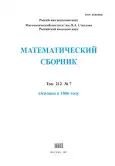Vol 212, No 7 (2021)
- Year: 2021
- Articles: 4
- URL: https://journal-vniispk.ru/0368-8666/issue/view/7479
Local controllability and optimality
Abstract
The concept of local controllability is introduced for a dynamical system; sufficient conditions for such controllability are presented. As a consequence, necessary conditions for a local infimum in an optimal control problem are obtained. These strengthen Pontryagin's maximum principle and extend it to more general classes of problems. Bibliography: 8 titles.
Matematicheskii Sbornik. 2021;212(7):3-38
 3-38
3-38


A strengthening of the Bourgain-Kontorovich method: three new theorems
Abstract
Consider the set $\mathfrak{D}_{\mathbf{A}}$ of irreducible denominators of the rational numbers representable by finite continued fractions all of whose partial quotients belong to some finite alphabet $\mathbf{A}$. Let the set of infinite continued fractions with partial quotients in this alphabet have Hausdorff dimension $\Delta_{\mathbf{A}}$ satisfying $\Delta_{\mathbf{A}} \ge0.7748…$ . Then $\mathfrak{D}_{\mathbf{A}}$ contains a positive share of positive integers. A previous similar result of the author of 2017 was related to the inequality $\Delta_{\mathbf{A}} >0.7807…$; in the original 2011 Bourgain-Kontorovich paper, $\Delta_{\mathbf{A}} >0.9839…$ . Bibliography: 28 titles.
Matematicheskii Sbornik. 2021;212(7):39-83
 39-83
39-83


The preservation of threshold resonances and the splitting off of eigenvalues from the threshold of the continuous spectrum of quantum waveguides
Abstract
Threshold resonance arises on the lower bound of the continuous spectrum of a quantum waveguide (the Dirichlet problem for the Laplace operator), provided that for this value of the spectral parameter a nontrivial bounded solution exists which is either a trapped wave decaying at infinity or an almost standing wave stabilizing at infinity. In many problems in asymptotic analysis, it is important to be able to distinguish which of the waves initiates the threshold resonance; in this work we discuss several ways to clarify its properties. In addition, we demonstrate how the threshold resonance can be preserved by fine tuning the profile of the waveguide wall, and we obtain asymptotic expressions for the near-threshold eigenvalues appearing in the discrete or continuous spectrum when the threshold resonance is destroyed. Bibliography: 60 titles.
Matematicheskii Sbornik. 2021;212(7):84-121
 84-121
84-121


Integrated solutions of non-densely defined semilinear integro-differential inclusions: existence, topology and applications
Abstract
Given a linear closed but not necessarily densely defined operator $A$ on a Banach space $E$ with nonempty resolvent set and a multivalued map $F\colon I\times E\multimap E$ with weakly sequentially closed graph, we consider the integro-differential inclusion$$\dot{u}\in Au+F(t,\int u)\quadon I,\qquad u(0)=x_0.$$We focus on the case when $A$ generates an integrated semigroup and obtain existence of integrated solutions if $E$ is weakly compactly generated and $F$ satisfies $$\beta(F(t,\Omega))\leqslant \eta(t)\beta(\Omega) \quadfor all bounded \Omega\subset E,$$where $\eta\in L^1(I)$ and $\beta$ denotes the De Blasi measure of noncompactness. When $E$ is separable, we are able to show that the set of all integrated solutions is a compact $R_\delta$-subset of the space $C(I,E)$ endowed with the weak topology. We use this result to investigate a nonlocal Cauchy problem described by means of a nonconvex-valued boundary condition operator. We also include some applications to partial differential equations with multivalued terms are.Bibliography: 26 titles.
Matematicheskii Sbornik. 2021;212(7):122-162
 122-162
122-162











